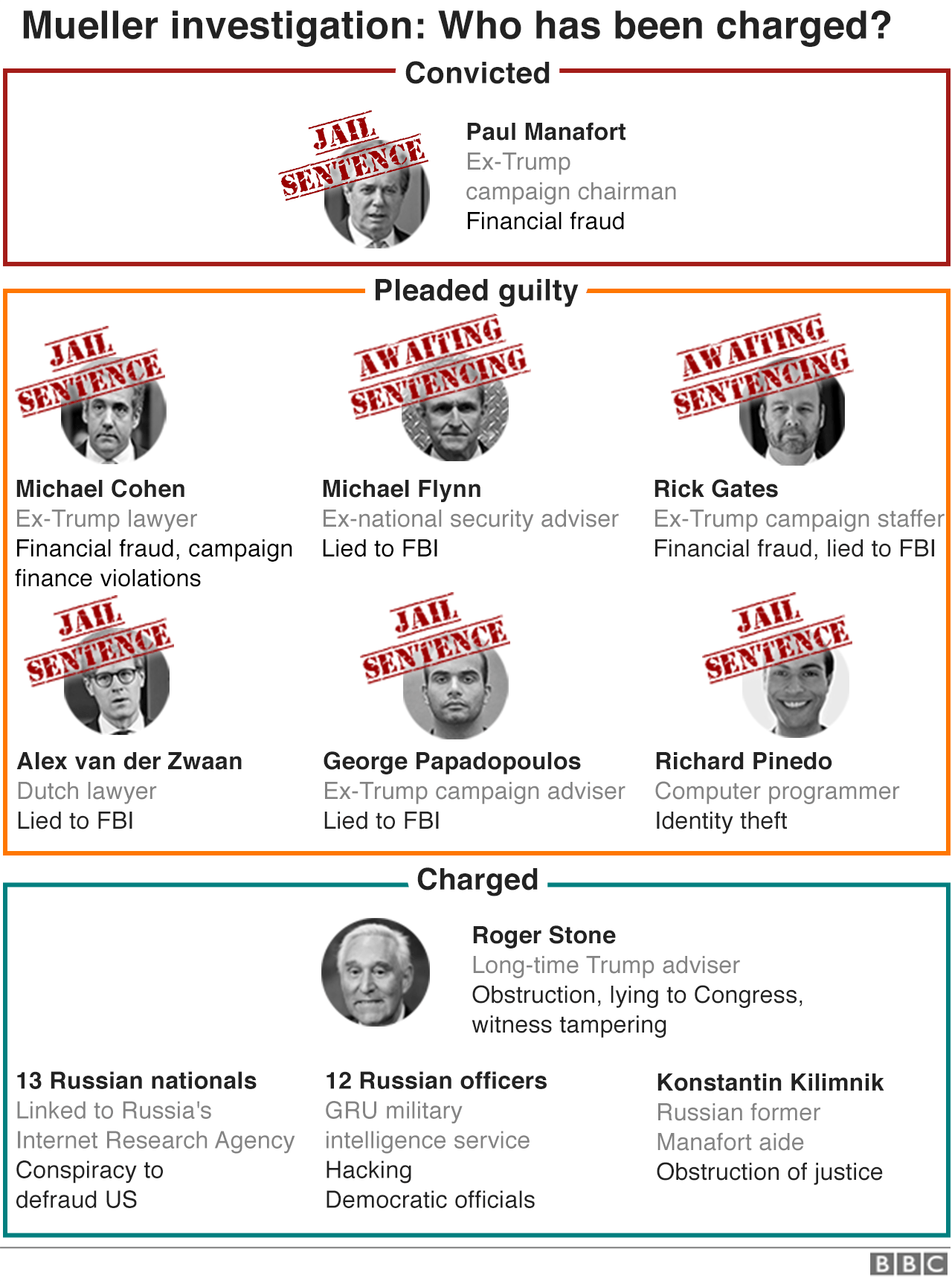This article is more than
5 year oldTrump-Russia inquiry: President 'did not conspire with Russia'

The report summary did not draw a conclusion as to whether Mr Trump illegally obstructed justice - not exonerating the president.
The report was summarised for Congress by the attorney general, William Barr.
President Trump tweeted in response: "No Collusion, No Obstruction."
- Follow live reaction to report's conclusions
- Mueller report: Key lines from Barr summary
- Read Barr's full summary of the report
Mr Trump, who repeatedly described the inquiry as a witch hunt, said on Sunday that "it was a shame that the country had to go through this", describing the inquiry as an "illegal takedown that failed".
The report is the culmination of two years of investigation by Mr Mueller which saw some of the president's closest former aides prosecuted and, in some cases, imprisoned.
"While this report does not conclude that the president committed a crime, it also does not exonerate him," Mr Mueller wrote in his report.
No Collusion, No Obstruction, Complete and Total EXONERATION. KEEP AMERICA GREAT!
— Donald J. Trump (@realDonaldTrump) March 24, 2019
What is in the report summary?
The summary letter by Mr Barr outlines the inquiry's findings relating to Russian efforts to influence the 2016 presidential election.
Mr Barr concluded: "The special counsel did not find that any US person or Trump campaign official conspired or knowingly co-ordinated with Russia."
The second part of the letter addresses the issue of obstruction of justice. Mr Barr's summary says the special counsel report "ultimately determined not to make a traditional prosecutorial judgment".
"The Special Counsel therefore did not draw a conclusion - one way or the other - as to whether the examined conduct constituted obstruction," the letter read.
Mr Barr says that the evidence was not sufficient "to establish that the president committed an obstruction-of-justice offence".
Mr Barr ends his letter to Congress by saying he will release more from the full report, but that some of the material is subject to restrictions.
"Given these restrictions, the schedule for processing the report depends in part on how quickly the Department can identify the [grand jury] material that by law cannot be made public," he wrote.
"I have requested the assistance of the Special Counsel in identifying all information contained in the report as quickly as possible."
How have US politicians reacted?
Congressman Jerry Nadler, the Democratic Chair of the House of Representatives Judiciary Committee, emphasised that the attorney general did not rule out that Mr Trump may have obstructed justice.
"Barr says that the president may have acted to obstruct justice, but that for an obstruction conviction, 'the government would need to prove beyond a reasonable doubt that a person, acting with corrupt intent, engaged in obstructive conduct'."
Democratic Senator Richard Blumenthal, a member of the Senate's Judiciary Committee, said that while there was a lack of evidence to support "a prosecutable criminal conspiracy", questions remained over whether Mr Trump had been compromised.
A good day for Trump
In his four-page letter to Congress, Attorney General William Barr summarises, mostly in his own words, the conclusions of the special counsel's investigation. In one key line, however, he directly quotes the report.
"The investigation did not establish that members of the Trump campaign conspired or co-ordinated with the Russian government in its election interference activities."
There, in Robert Mueller's own words, is the end result of nearly two years of work, 2,800 subpoenas, hundreds of search warrants and countless hours of interviews. There were "multiple offers" of help from "Russian-affiliated individuals" to the Trump campaign, but they never took the bait.
There was, as Donald Trump might say, "no collusion". At least, no evidence of it was unearthed.
The obstruction of justice component is a murkier matter. The decision of whether to charge Mr Trump with interference with the various investigations wasn't Mr Mueller's. Saying it involved "difficult issues", the former FBI director punted.
Instead, Mr Barr - in consultation with Department of Justice staff - decided not to prosecute, in part because there was no apparent underlying crime to obstruct.
Make no mistake, today was a very good day for Mr Trump.
While a bevy of inquiries into his presidency will grind on, the shadow of Mr Mueller's investigation - hovering over the White House since May 2017 - has been lifted.

Read More (...)
Newer articles
<p>The British singer/songwriter/DJ will perform at Warner Theatre on May 16.</p>
For Putin, Gaza is an endless gift
Bombshell new theory on Titan sub disaster
Russia pounds Ukraine with biggest airstrikes in weeks
Woman'sCanadian citizenship revoked after 32 years amid 'error'
‘Orange turd’: Porn star’s swipe at Trump
WWE icon ruthlessly axed after 32 years
Justin Bieber announces huge personal news
Netflix edits out awkward Kim moment
How Kendrick Lamar and Drake changed rap beefs forever Rapid-fire releases and fast pace of modern life elevate diss war to levels unparalleled in hip-hop history.
